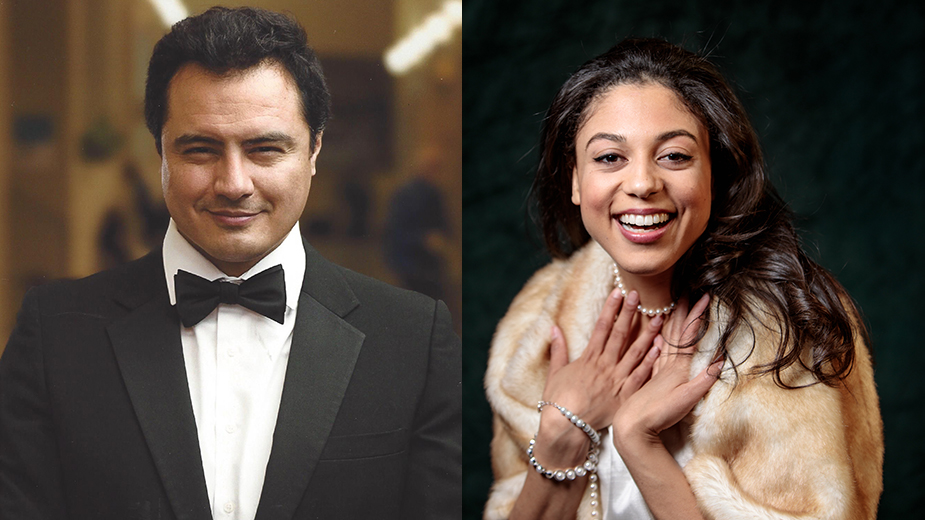YOUNGSTOWN, Ohio – Out of necessity comes innovation, and that is the case with Opera Western Reserve’s Nov. 12 production of “Romeo and Juliet.”
When production director Scott Skiba and music director Susan Davenny Wyner were planning the show, they were not sure if they would be able to do it as a complete production live on stage with a full cast, chorus and orchestra. The pandemic-related uncertainty meant the show must be flexible in case a last-minute shutdown forced it to pivot to a filmed production.
As a compromise, they put together a hybrid show that combines the music of French composer Charles Gounod’s “Romeo et Juliette” opera with the script of Shakespeare’s tragic play.
Only the two lead characters sing, and they do so in French. The rest of the cast speaks their parts in the Elizabethan English dialog penned by Shakespeare.
The result is a reimagined production that could interest fans of both opera and The Bard.
It also moves faster and has a shorter run time – roughly two hours, including a 30-minute intermission.
While everyone knows the tragic story of Romeo and Juliet, OWR’s version might be a bit easier to follow because much of it is spoken and in English. Supertitles of both the French lyrics and the Shakespearean dialog will be projected above the stage.
Skiba says the vocal and spoken elements are weaved together in the hybrid production.
“We’ve taken parts of both and created one story line,” he says.
The show opens with the overture and mixes in the spoken prologue before giving way to the first sword fight. That pattern repeats itself throughout the show as it toggles between sung and spoken.
Skiba came up with the concept and mapped out the new script.
“We talked about doing Gounod’s opera but then we thought we might have to do it cinematically,” he says. “We weren’t sure what would be possible. I said, ‘What if we did a hybrid version? Have just two characters sing and the other characters speak?’”
Having only Romeo and Juliet sing serves to separate them from everyone else, reinforcing to the audience that the two are alone in their ordeal.
THE CAST
The two lead roles are being sung by Sarah Joyce Cooper and Jesus Daniel Hernandez. Cooper, a soprano, is making her OWR premiere. “She is a fantastic up-and-coming soprano who jumped off the screen as we were reviewing recorded auditions,” Skiba says.
Hernandez is familiar to OWR audiences, having last appeared as Pinkerton in the 2018 production of “Madame Butterfly.” Skiba calls him “a familiar face and an audience favorite.”
Skiba and Davenny Wyner worked together to incorporate the music into the scenes, but when she became unavailable to conduct the orchestra, Dean Buck of Cleveland Opera Theater was brought in.
Buck, who also served as music director last year for the recorded production of “La Traviata,” said OWR’s version of “Romeo and Juliet” is different from anything he has ever done.
“It was born out of the need to plan something a year in advance,” he says. “We needed to put something in place that we could do live… and in the event had to go digital-only, we could still do it.”
Buck says the entire team is working in a new zone. “I think it’s going to be interesting,” he says.
He agrees that having only the Romeo and Juliet characters sing will make their love, and its tragic outcome, move vivid for audiences. “Adding music to only those two adds a new dimension, and will help the audience feel why they’d rather die than live apart,” he says.
In terms of the music, Buck says Gounod’s work is fantastic. “French romanticism – you can’t get much better than this,” he says. “It reflects the drama and it’s paced incredibly. Gounod was a terrific composer and this is the best operatic adaptation of ‘Romeo and Juliet’ in the repertoire. ‘West Side Story’ is the only other one that holds up to this one.”
SWORD FIGHTING
Another highlight of the show – one that is visual – will be the sword fighting. Jason Paul Tate is the fight choreographer and also plays the role of Tybalt. Tate is an acclaimed New York-based director, choreographer and performer whose credits include the Public Theatre’s Shakespeare in the Park and the Metropolitan Opera.
Joz Vammer is associate fight director and plays the role of Benvolio. Leilani Barrett, a professional choreographer and dancer, plays the role of Mercutio.
“Because there are fewer singers in the production, we wanted epic ‘Princess Bride’-level sword fighting,” Skiba says. “We got [Tate] there to teach and also be in it. These are professional fighting actors. So there will be incredible sword fighting, movie-level swashbuckling.”
The cast also includes Judge Carla J. Baldwin of Youngstown Municipal Court, who plays Prince Escalus. To make the role reflect real life for Baldwin, her character’s title been changed to The Magistrate. But like Escalus does in the play, The Magistrate banishes Romeo from Verona.
Baldwin is also an OWR board member.
OWR’s production will be visually compelling in other ways. It uses “opulent” period costumes, Skiba says, and instead of physical sets, scenery will be projected onto the back wall of the stage.
“We went all out,” he says, “but in a different direction. We’re using digitally-mapped projection that acts as locations and scenery. It also can morph and change. You can see the mind’s eye of Juliet as she is having a panic attack. A canvas backdrop couldn’t do that.”
The music will be expansive but the orchestra will be cut down to 19 instruments in keeping with COVID recommendations.
“There will be fewer wind players,” Skiba says. “To the opera connoisseur, it won’t have the same impact as a 70-piece orchestra. But for people who want that orchestra sound, it will deliver.”
Pictured: Jesus Daniel Hernandez and Sarah Joyce Cooper.
